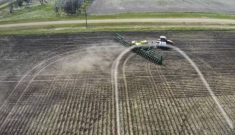Ross Bricker was a hard guy to get hold of that Tuesday. He wasn t in his office and his cellphone kept jumping right to voicemail. I wondered, is he on a conference call that just won t quit? Is he stuck in an endless meeting? Maybe he s on year-end, or has to put total effort into hitting some deadline.
The next day, Bricker is apologetic. He had to take a vacation day, he tells me. After all, it was auction day, and he needed to get some of his registered polled Herefords to the bull sale.
Read Also

How scientists are using DNA and climate data to breed crops of the future
A method for forecasting how crops will perform in different environments so that plant breeders can quickly select the best parents for new, climate-resilient varieties.
Now that he s back in the office, Bricker has exchanged his mucky boots for shiny corporate loafers and he looks every inch the corporate executive that he is president and CEO of AVAC, a private, not-for-profit company that invests in promising value-added Alberta businesses.
To date, AVAC has helped clients generate sales of $485 million and attract additional investment of more than $603 million.
AVAC was established in 1997 when the Alberta government decided the agribusiness, electronics, life sciences, and industrial technology sectors in the province were getting left on the sidelines of the boom in value adding. So with startup funds of $35 million from Edmonton and $10 million from Agriculture and Agri-Food Canada, AVAC began to identify and invest in promising Alberta-based agribusinesses.
Its mandate to stimulate the value-add sector and to promote the commercialization of innovative value-added products and services grew into sectors beyond agriculture about five years ago.
The question I ve got for Bricker isn t how a farmer can manage a diverse operation like this. Farmers have business smart that will let them compete in virtually any sector. No, what I want to know is how agriculture fits into such a big-picture venture without getting lost.
Bricker s attitude is that agriculture doesn t have to apologize to anyone. Not only are its farmers smart, its outlook is stellar in an uncertain economy.
Like many farmers who hold off-farm day jobs, Bricker is used to juggling his office and farm roles. The fact that his office job is also tied to agriculture 65 per cent of AVAC s investments are in the agribusiness sector not only suits his admitted preference ( I m a fourth-generation Alberta farmer, so I have a bit of a bias. ) but it s also where he sees the most investment opportunity.
Agribusinesses and areas related to environment surrounding agriculture are probably the No. 1 area for (investment) growth, in particular in North America and in Canada for sure, Bricker says. The amount of investment opportunity in agriculture is really significant almost staggering.
The destruction of the public markets with sub-prime lending and the credit crisis really rattled the investment community, Bricker says. At the same time, the energy sector really turned down. Those two things signalled a rethink as to where investors want to put their dollars.
Burgeoning demand, both for quantity and variety in agri-products, means agricultural investment offers solid long-term fundamentals. Here at home, our aging, increasingly unhealthy population, combined with consumer demand for a multitude of specialty products, means entrepreneurs have endless agri-opportunities. Globally, the need to feed, clothe and provide energy to more than nine billion people by the year 2050 will continue to drive demand for our safe, reliable and high-quality agricultural products.
If you had asked the question why does agriculture make a good investment? a few years ago, people would have really struggled to come up with an answer, says Art Froehlich, AVAC s board chair. Today s attitude is light years ahead. Says Froehlich: Agriculture is the only industry that is going to solve some huge issues.
Bricker and Froehlich s enthusiasm for agri-investment is much more than idle talk. AVAC has been involved in bringing many agri-based startup companies to impressive success. Some of their biggest name agri-investments include Afexa, the maker of ColdFX; SemBioSys Genetics Inc., a biopharmaceutical company that grows human insulin in plants to combat diabetes; and Botaneco, an oilseed innovator that isolates oil bodies for use in emollients and cosmetics and as pharmaceutical carriers.
AVAC s list of success stories proves that entrepreneurial businesses don t have to start big to thrive. When we went through recession, I kept hearing companies were too big to fail, says Froehlich. Most businesses in our (client base) are thought of as too small to succeed. Yet most successful businesses started in a basement.
As well, for those who think only brand new products will claim market share, AVAC s clients prove that a twist on an old idea may be enough to generate impressive results.
A prime example is RedMoon Custom Pet Food. Noting pet owners increasing commitment to and willingness to spend money on their four-legged children, entrepreneur Jason Bailey developed a creative turn on the long-standing concept of pet food.
Ordered online and delivered directly to your door, Red- Moon s fresh-made pet foods are formulated with locally sourced ingredients and lots of fresh meat. They contain no corn, wheat, soy, glutens or other common allergens.
In case that s not enough to pique Fido s discerning palate (or more correctly, Fido s owner s complex purchase attitudes), there s more. RedMoon products are the first customized dry pet foods in the world. Based on a six-step online questionnaire, RedMoon identifies a custom blend of ingredients and supplements to suit each pet s individual health profile and dietary needs.
Bailey says the opportunity for value-added agri-products is huge. He should know. RedMoon has posted double-digit growth every month since it opened a year ago, and Bailey anticipates hitting $5 million-plus in annual revenue in the next two to three years.
When it comes to entrepreneurial success, Bailey s advice is simple and to the point. Spend the time, create a new product, do some nice packaging, and go after the high-margin and value-added business, he advises. That s where the real opportunity is.
Having spent years supporting a wide variety of agriinvestments, Bricker has also learned some lessons about what separates success from failure in agribusiness.
The product and the market are table stakes, Bricker says. The decision as to whether we invest is based on the people. At the end of the day, their ability to do the job and recruit the right people is what will make the company successful& or not.
———
Investment opportunity in agriculture is really significant almost staggering.
Ross Bricker














